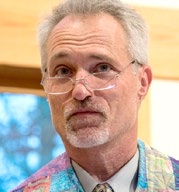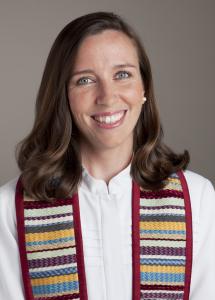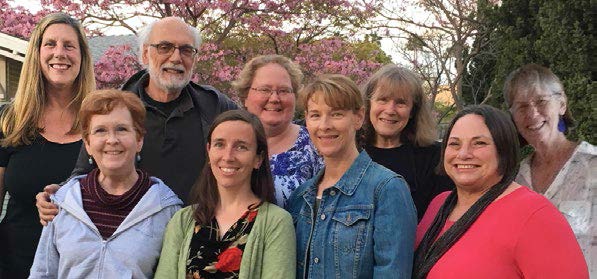From Our Minister Archive
 Growing Goodness
Growing Goodness
Dear Friends,
Over the course of my two decades in the UU Ministry, there are two things that I have found myself being deeply drawn toward: the call of work that is worthy and the good partners that are indispensable in that work being successful.
Work that is worthy is work that sees and summons a spark — a truth — something that is essential to the possibility of growing goodness in the world. I can tell goodness because, when I find it inside of me or in others, it is constantly linked to happiness, hope, creativity, justice, joy. Some of our ‘work’ is learning to see the latent power in our core truths — because they’re almost always buried beneath layers of old hurt, doubt, cynicism, worry and fear. But an even larger part of our work is finding the courage to remove all the ‘protective’ layering we carefully placed around such truths so that they can come alive. The joy at the heart of the world never wanted to be protected. It wanted to come alive.
It was a great joy to be with you for a weekend. In a very short time, I got a chance to put a few faces to names — a little flesh on the bones of the history I read about in your materials. The real beauty of UUCCSM is not your bylaws or policies or the narrative histories I’ve read. It’s certainly not in the challenges I’ve heard described. Your real beauty is the humanness you bring. Your heartfelt drive to be become your best selves. To imagine your best contributions leading to the best community. Your real beauty is in your aspirations toward becoming a beloved community.
You won me over by presenting me with a great gift — one which you might not even be aware of having offered. On the Saturday and Sunday I was with you in May, I got a chance to hear a half dozen stories about my mother, Celia Ward, from people who knew her (largely from her work at de Benneville Pines in the 70s and 80s). My mother, for a relatively small woman, was ‘large and in charge.’ She was often brash and imposing. She could swear like a sailor. But she could also be quite tender and wise. Some saw her as a great mentor and leader. Some, as a great pain in the #$@&%!. To her children, she was a complex mix of both. Not always in the right proportions with the right timing (I trust I am not saying anything too unfamiliar to anyone who compares the parent they were given with the one they sometimes fantasized about). The stories that I heard about my mother contained an awareness of both sides of her.
Part of my ‘work’ over the last 50+ years has been to look, learn, understand, integrate, and accept the various inconsistent – even contradictory — parts of my mother. One of the great gifts we can be given is to be among people who ‘get’ the complexity we’ve been caught up in.
A Buddhist novitiate once asked his master to tell him about delusion. “You are asking me about the horse,” the master said, “and you are riding on it.”
It is my great hope that I can offer some of the same gifts you have helped to give me: a chance to see clearly some of the complexity from which you have emerged. Because what you hope for is what I hope for: to look, learn, understand, integrate, and accept all that you have been given. And to know it is a great gift. A truth. A spark. To remove the hurt or doubt or cynicism that has been draped upon it. And to see it is being called to do great things. It just needs a people with the courage to see its power and use it well.
To the Glory of Life.
— Rev. Greg Ward
 Passing the Torch: Saying Thank You and Keeping Covenant
Passing the Torch: Saying Thank You and Keeping Covenant
Rev. Rebeccca

 Moments of Connection and Love
Moments of Connection and Love
All around us worlds are dying and new worlds are being born;All around us life is dying and life is being born.The fruit ripens on the tree;The roots are silently at work in the darkness of the earthAgainst a time when there shall be new leaves, fresh blossoms, green fruit.Such is the growing edge!It is the extra breath from the exhausted lung,The one more thing to try when all else has failed,The upward reach of life when weariness closes in upon all endeavor.This is the basis of hope in moments of despair,The incentive to carry on when times are out of jointAnd people have lost their reason; the source of confidenceWhen worlds crash and dreams whiten into ash.The birth of the child—life’s most dramatic answer to death—This is the Growing Edge incarnate.Look well to the growing edge.
Rev. Rebecca
 Moments of Connection and Love
Moments of Connection and Love
Five hundred twenty-five thousand six hundred minutesFive hundred twenty-five thousand moments so dearFive hundred twenty-five thousand six hundred minutesHow do you measure — measure a year?
 Please Seek— and Give—Care
Please Seek— and Give—Care
Dear Congregation,
At this time, I want to remind you that my goal is for your church to be a place where you will be cared for, and where you will be called upon to care for others. As your minister, I meet regularly with congregants to offer pastoral care in times of crisis, critical decisionmaking, or at other moments of deep reflection and need for increased spiritual support. In the past few months I’ve been with you through conversations, calls, texts, and emails as you cope with national politics, make it through a tough day, respond to news of my departure, await test results at the hospital, move a loved one into hospice care, or face the loss of a beloved. I also make hospital visits and reach out regularly to our Super Seniors by phone.
At the same time, in a congregation as large as UUSM, it is simply not possible for the minister to serve every pastoral need. Most congregations of our size also have a lay ministry, a group of volunteers trained and supported by the minister who offer caring support and a listening ear to one another, particularly in cases of ongoing need (rather that an emergent crisis). Unfortunately, our congregation lacks such a group of volunteers, and has a history and a culture that, in recent years, has worked against bringing such a group together in a sustainable way. My hope is that such a lay ministry will be a part of the congregational system our leaders will be able to become more aware of, and find more success in changing, in the future.
For now, your board and I are in agreement that we can anticipate an increased need for pastoral care at this time of transition in Washington, DC, and ministerial transition here. To meet this need, I again invite you to call or email me directly, speak with a board member, attend a Listening Circle with our Right Relations Task Force, share with your Heart to Heart Circle, and/or consider reaching out to Michael Eselun, a church member and chaplain who is on-call for additional pastoral care. If you are wondering if you “really need” this support, or if we should “save” this care for someone else, please reach out to me or another person who can offer care and support to you.
Yes, I mean you.
Additionally, I am asking you, again, to reach out and to keep reaching out to your friends in the congregation to check on them, as well. Care is built when we know that there are other members (not only the minister) in our community who are thinking of us, looking out for us, and noticing what is going on with us, in one-on-one relationships of mutuality, authenticity, and trust.
This is what we are here for. This is how we journey together in troubled and troubling times.
With you,
Rev. Rebecca
minister@uusm.org
PS: On MLK Sunday, one of you asked me why we didn’t have “Lift Every Voice and Sing” as one of our service hymns. My answer: In commemoration of Black History Month, we will sing this song as our opening hymn every Sunday in February, as we consider what it means to be a Community of Identity — our ministry theme this month.
 Now is the Time for Sacred Resistance and Sanctuary
Now is the Time for Sacred Resistance and Sanctuary
 Keeping Our Kids Safe
Keeping Our Kids Safe
 New DRE Brings Us to Full Staff
New DRE Brings Us to Full Staff
I’m delighted to welcome our new Director of Religious Education, Kathleen Hogue (see page 3 ). Hats off to our DRE Search Committee for their leadership and commitment to the future of religious education and exploration at UU Santa Monica. The committee is going to support Kathleen by continuing as the DRE Transition Team. Its members are Leon Henderson-MacLennan and Jo An Peters, co- chairs; Denise Helton, Dan Patterson, Nalani Santiago-Kalmanson, James Witker, and me.
A DRE Start Up Workshop will be scheduled with the UUA Congregational Life Staff, and we are planning an installation to formally welcome Kathleen to our community with a special service of worship and celebration. Please stay tuned for more opportunities to welcome Kathleen and help her feel at home in Los Angeles.
It’s wonderful to be back at full staffing for our Sunday worship services. Our choir is once again singing at our 11 am services, led by Dr. Zanaida Robles. And we plan to have a children’s choir at 9 am services in October, led by Zanaida with help from Lois Hutchinson and her daughter Delaney.
I’m also appreciative of the work of our Long Term Right Relations Task Force, which was appointed by our Board in August and met weekly in September to help us navigate conflict and leadership challenges facing our congregation. We will continue to meet at least twice a month for the coming year. Please ask me and other members of the Task Force what we are learning about congregational systems, conflict transformation, and becoming self-differentiated leaders. The other members are Helen Brown, Leon Henderson-MacLennan, Emily Linnemeier, Vilma Ortiz, Margot Page, Tom Peters, Beth Rendeiro, Sue Stoyanoff, John Sussman, and James Witker.
This month we join UU congregations across the country to consider, embody, and practice what it means to be A Community of Healing. As I wrote last month, our church is now part of the Soul Matters Sharing Circle, an international community of UUs connecting around theme-based questions, resources, and spiritual practices throughout the church year. This month I’m including the Soul Matters monthly column alongside my own. Have you visited the Soul Matters website (soulmatterssharingcircle.com) or FB page to go deeper during the month? What do you think of the questions? (To download content, you need to join. It’s simple and free.) I’m eager to hear how this resource can support you on your spiritual journey, and how this timely theme is speaking to our community in this moment of our journey together.
With you,
Rev. Rebecca
 Beginning Again, in Covenant
Beginning Again, in Covenant

 What Kind of Church Are You Looking For?
What Kind of Church Are You Looking For?
Rev. Rebecca
 PS: Here is a link to a study on the postmodern search for “something more” by Harvard Divinity School students Casper ten Kuile and Angie Thurston, with support from the Fetzer Institute. Be sure to check out their description of Sunday Assembly, co-founded here in Los Angeles by Ian Dodd. http://fetzer.org/resources/something-more/
PS: Here is a link to a study on the postmodern search for “something more” by Harvard Divinity School students Casper ten Kuile and Angie Thurston, with support from the Fetzer Institute. Be sure to check out their description of Sunday Assembly, co-founded here in Los Angeles by Ian Dodd. http://fetzer.org/resources/something-more/
